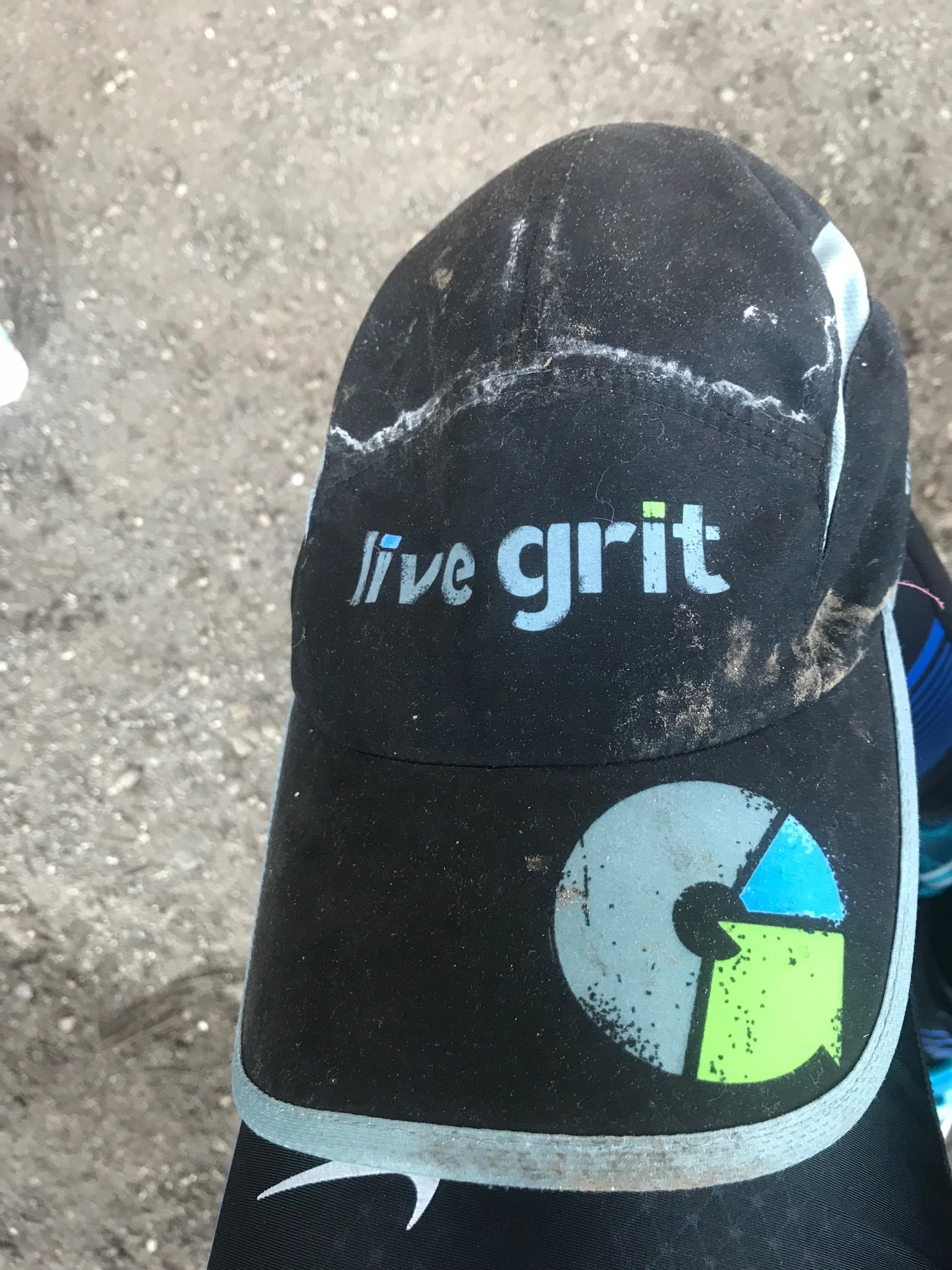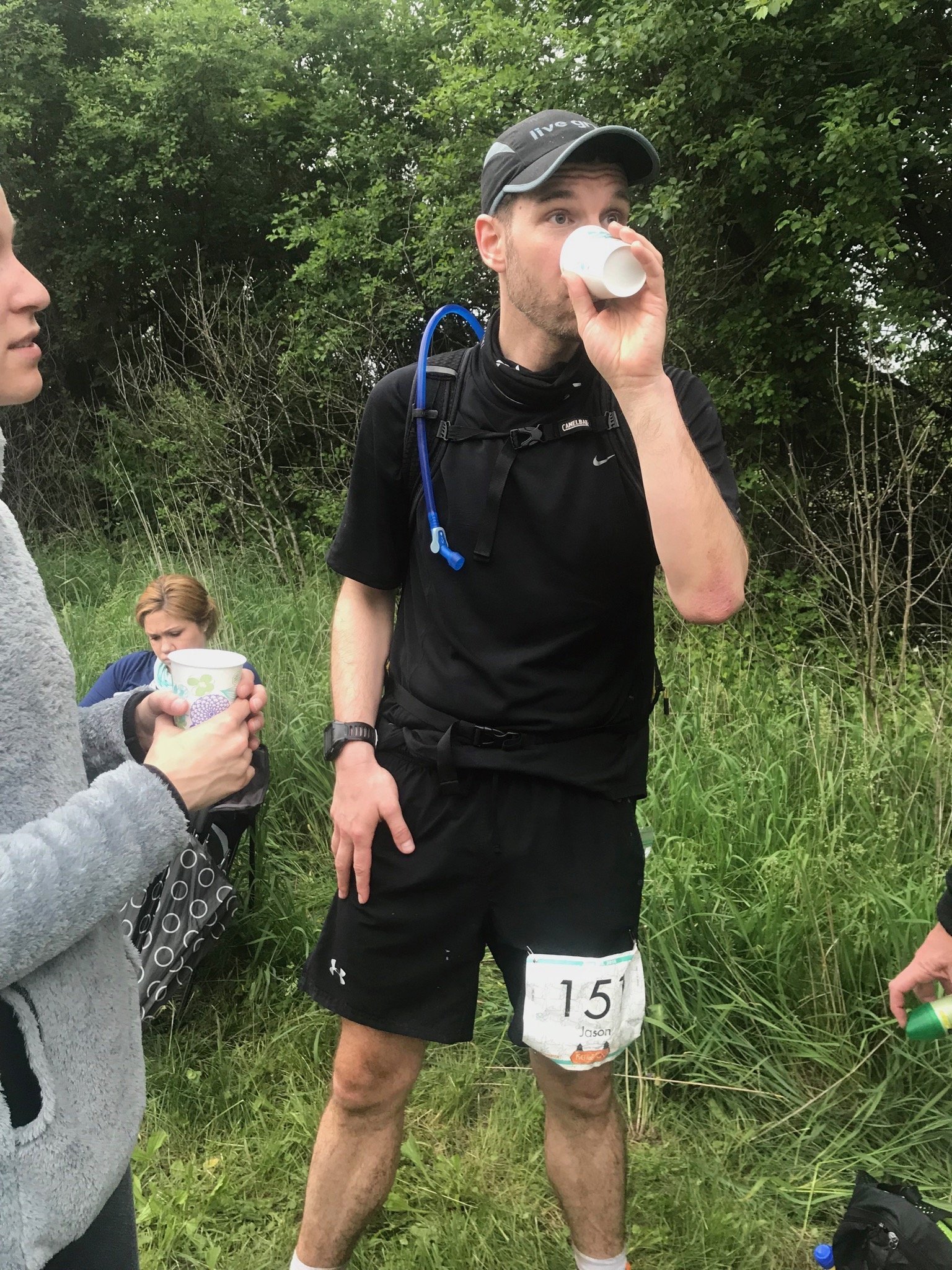I Can Do Hard Things (Or, How Much it Hurts to Run 100 Miles)
by Jason Patera
June 20, 2018
[I Can Do Hard Things was also published by Chicago Athlete Magazine on October 30, 2018.]
“I am DONE WITH THIS BULLSHIT,” Ben screamed at me. “Get up, get moving, and FINISH THIS RACE.”
I slouched in a dirty folding chair at the Mile 86 aid station of the Kettle Moraine 100 Miler on Wisconsin’s Ice Age Trail. I had been running for about 24 hours: my feet were covered in torn blisters, my shorts had shredded my thighs, and my quads were failing. I had sprained my left ankle, I was in a severe calorie deficit, and minutes ago I had made no attempt to avoid collapsing when I felt my legs buckle. Any willpower I had left was locked behind a door in my head. There was no way I was moving another inch.
The crew — Sharon, Todd, Emily and Ben — looked grim, but Ben, a veteran ultramarathoner, wasn’t having it. He ripped the Mile 86 sign out of the ground and thrust it in my face, incensed that I had accused him of lying about only having 14 miles to go. “YOU. ARE. NOT. QUITTING!” He threw the sign to the ground, shaking with fury.
The door in my head swung open. Anger flushed my face. I pushed myself up. I ran. Hard.
I had fallen in love with the idea of running a 100-mile trail race the year before, when my partner and I paced parts of this same race for Ben. I was eager with my questions, and his gentle encouragement cemented my desire. I signed up the day registration opened, and (mostly) adhered to a conservative training plan that Ben and Emily put together for me. We built in some important benchmarks: if I ran 150-175 miles a month (while maintaining my run streak), raced a 50k in April, and ran back-to-back 25-milers one weekend in May, I’d allow myself to feel like I had earned the right to be there.
At our pre-race crew meeting the week before the race, I had pointedly warned everyone to not let me quit. If I announced I was “out” at an aid station, I had to go to the next one — 5-10 miles away — before stopping. If I said I felt bad, they were to remind me that it probably wasn’t permanent. If I argued that I was injured, they were to ignore me unless (or until) I couldn’t actually move forward.
At the time, these rules were purely conceptual: contingencies we’d never actually need. And for the first 14 hours, I felt mostly good (often great), certain I would finish. Todd told me I looked strong, and I believed him with little-brother trust, savoring the high fives and laughing at everyone’s “Team Patera” shirts. The crew was calibrated with surgical precision, from Emily fixing my feet, to Ben performing miracles with a buff and a few handfuls of ice. Sharon told me I was an Instagram sensation: #justkeephimalive.
Back at it, the soft crunch of the dirt under my feet lulled me into a deep peace: left… right… left… right… sun, breeze, trees, trail. Everything was beautiful.
I ate endless gels and sipped water out of my pack. I wondered if I’d see the moon later. I listened to the birds sing. I counted steps. I fantasized about pizza. I wondered if I’d hear thunder later. I listened to critters skitter about, just out of sight. I thought about doing hard things. I sipped water out of my pack and ate endless gels.
I hadn’t seen another runner for hours when I emerged from the deep woods onto an equestrian trail, surprising two riders. I gasped and smiled, inspired by the majesty of the animals. My mom would’ve loved this. The horses chuffed “hello,” and I trotted on, hoping to remember all of the joyful little moments.
By the time I reached the Mile 62 aid station, the sun had eased below the horizon. I was tired and hurting, but still able to laugh about my blisters. Emily helped me change my socks (by doing it for me) and Todd and Sharon administered chicken broth and bug spray. Everyone assured me that the math was in my favor: I was going to finish well before the 30-hour cutoff. Before long I walked with Ben, my first “pacer”, back out into the night. The assembled crew and spectators cheered (lots of runners give up here) and I pumped my fist, unaware that the wheels were about to come off the wagon.
The problems started almost immediately. Ben wanted to run/walk in time intervals, and he didn’t read my mind that I preferred to count steps to get through tough stretches. He exhorted me to eat, but I was getting sick of the goddam gels. I rolled my ankle — on nothing — and felt the familiar “pop” of a sprain. It occurred to me that even if I got really hurt, we were still miles and miles away from, well, anything.
Emily took over pacing duties around Mile 70, and I delightedly shouted “bring it!” to the sky when a midnight thunderstorm erupted. We settled into a good groove, clicking off the miles, telling stories and counting steps. Then, of course, I tripped — on nothing — and face-planted into the mud. The boyish giddiness of running in the rain evaporated. Now, I was convinced that if we went too fast I’d knock my front teeth out.
By the time Todd joined me around mile 77, I was hemorrhaging willpower. Everything was wrong: my shorts tore at my thighs, my headlamp was too dim, my feet refused to land where I wanted them to land. We lumbered for four miles — an endless uphill slog — to the last turnaround point of the day. I announced that I didn’t think I could go on.
Sharon immediately pointed out that quitting without advance notice was against my own rules, and Louisa told the crew that I’d never forgive anyone (including myself) if my race ended now. I desperately needed calories, but the thought of eating turned my stomach. In a hushed conversation 10 feet away, the crew hatched a plan. We trudged back onto the trail, and Todd fed me one Swedish fish every minute or so until they were gone.
Running was out of the question — we focused on my not tripping over rocks and roots that, 22 hours ago, I would have ignored completely. I fell anyway and, lying on the ground, pleaded with Todd to just let me stay there for a while. Within seconds, though, a dense cloud of mosquitos swarmed my legs and arms. I scrambled to my feet. The misery was abject.
The chafing was so bad that I spent the next four miles with my hands in my shorts, just trying to keep the fabric away from my skin. Every hundred steps I asked Todd how close we were to the aid station. “Almost,” he’d say, borderline cheerful. “Just, uh… around this, um—HEY, did you hear that OWL?” (I didn’t hear. I had fallen asleep leaning against a tree.)
We finally arrived at the checkpoint well after dawn, and I told the crew I was done. They fed me soup; I said I was done. They changed my shoes; I said I was done. They helped me into chafe-free sweatpants; I said I was done. Ben said I could quit if I did it at the trailhead. Fine. I staggered over and, feeling my legs buckling, embraced the collapse. Surely they wouldn’t try to make me go on now.
The crew dragged me back to the chair and made me eat some potatoes. I mumbled something about having made peace with giving up. That’s when Ben snapped.
Running is a joyful experience for a lot of people, but not for me. Louisa bounces around like a little girl on every run, meeting new friends, saying hello to the ducks and the trees, dancing to the music in her headphones (or in her head). Me? I could say I like the runners’ high (or more honestly, the simple relief of stopping.) I could say that I enjoy the connection with the road or the trail, or that I enjoy tracking my workouts.
But, really? Anyone who signs up for this insanity is running from something. And while Ben’s rage had broken open the door to my last reserves of will, my demons were waiting in that room, too. Pushed to exhaustion, I couldn’t fend off their taunts: You’re still fat. You’re not good at your job. You’re not smart, or funny. And you certainly don’t belong here. Poor Sharon. She had signed up to run a few miles in the woods with me, not conduct therapy.
I had six hours to complete the last 14 miles: I could have crawled and made it before the cutoff. But the crew had confiscated my watch and — deeply confused about the math and convinced that time was running out — I frantically barked questions at Sharon. What’s our pace? How much further?! WHAT TIME IS IT?! “Time to eat this gel,” she’d say, in the tone of a dear friend who has forgone sleep 26 straight hours to indulge your inferiority complex. “I don’t want to see any more of your tomfuckery at the next aid station.”
The day before, the sun had been friendly, gently greeting the runners after a chilly morning. Now, a day later (had I really been running for 28 hours?!), it clawed my face. Mile 94. The rocky hills — truly “death by a thousand paper cuts” — pulverized my bloody feet as Ben coaxed me up the rest of the 8,801 feet of climbing. Mile 95.
Mile 96.
“You see that guy up there? Don’t let him beat you. Let’s catch him.” He handed me another gel. I ate half of it, dry heaved, and asked Ben for some quiet time.
Mile 97.
Mile 98.
“I’m proud of you.”
Mile 99.
I find some legs when the finish line appears, and Ben peels off. I hear my friends before I see them, and only now does it actually feel like I’m going to make it.
Mile 100.
I high-five the race director and crumble to the ground. I hear Todd say, “That. Was. Awesome.” Someone (me?) is crying. I think about a mantra, taught to me years ago: I can do hard things.
//
The Numbers
100.6 miles
8,801 feet of climbing
29 hours, 12 minutes
51 gels, 17 Cliff bars, ~20 liters of water, and lots of other food
~19,000 calories burned
3 black toenails
1 sprained ankle
many, many blisters




